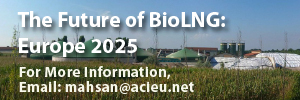The keys to making biomethane a sustainable fossil fuel alternative?
Major research in Malaga, Paris, Skopje and Zagreb claims to have made significant strides in the bid to implement food waste to biomethane initiatives.
Funded by the EU’s Horizon 2020 scheme, the Bin2Grid project aimed to implement waste-to-biofuel initiatives in the four cities with the goal of developing biomethane as a sustainable alternative to fossil fuels. In particular, the two-year project promoted the segregated collection of food waste from specific and various waste producers (food and beverage industry, catering, residential) in order to produce biomethane to be used in local filling stations.
“None of these target cities had implemented the concept of waste-to-biofuel prior to Bin2Grid,” says Bojan Ribić, coordinator of the project on behalf of Zagreb City Holding, in a statement.
Members of the Bin2Grid initiative “recommended specific activities to decision-makers; issued reports, guidelines and feasibility studies; and provided examples of best practices.”
In Paris, for instance, the consortium concluded that new partnerships between stakeholders to balance supply and demand combined with measures such as a favourable tax regime could prove a boost to the sector.
Another key part of the project has been developing economic tools to help boost the profitability of proposed waste to biomethane concepts.
“Our dedicated tools can assist stakeholders in the setup of sustainable waste management combined with renewable energy production in local communities. One example is an Excel-based benchmark tool which compares organic waste in the biomethane value chain with other waste treatment value chains such as landfilling, composting and incineration. This tool was already applied to seven cities,” Ribić explains.
The project’s biomethane tool can apparently be used to estimate investment, operating and initial costs of different facilities by providing an idea of economic conditions around biogas production, gas upgrading and the utilisation of biomethane.
Although the project has now come to an end, the consortium members plan to continue disseminating project outcomes and results.
“We strongly believe that our proposed concept is the most sustainable solution regarding for the management of biowaste and its usage as a biofuel,” Ribić says.




















